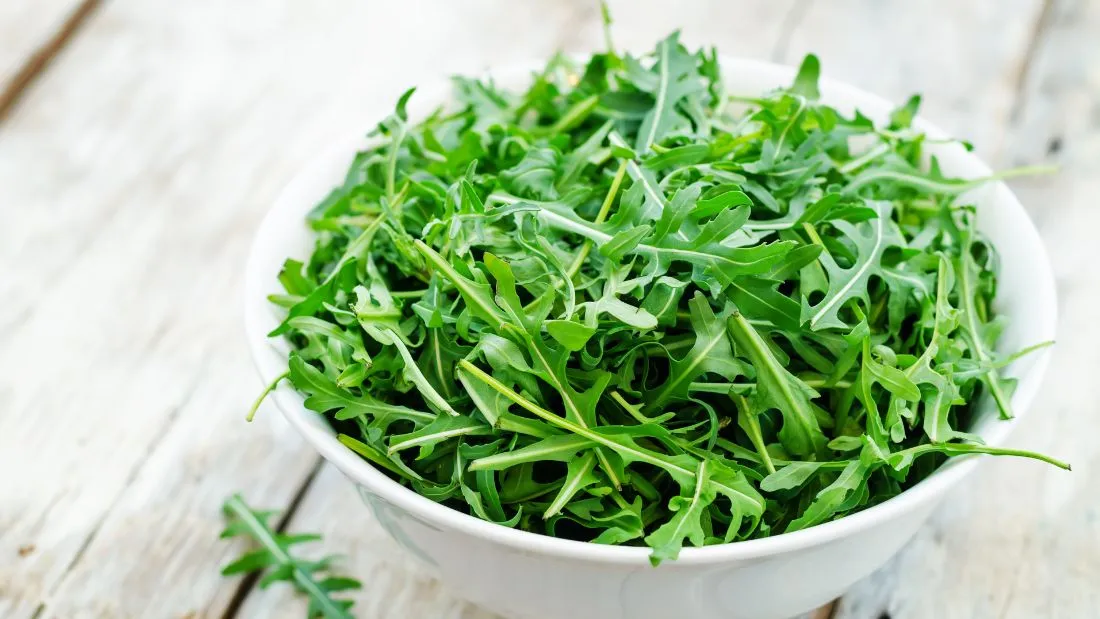Rocket

Rocket is also known as arugula, comes from the Mediterranean and belongs to the cruciferous family – along with kale, broccoli, cabbage and Brussels sprouts. Its tiny leaves have a strong, peppery and slightly bitter flavour. Even though rocket leaves are the main star, if you grow your own, you can also eat its flowers and young seed pods.
Nutrients in rocket
One cup of rocket leaves – which is about 20 grams or a handful – doesn’t contain much in the way of protein, carbohydrates or fat but it packs a good dose of micronutrients. It provides 10 per cent of your recommended daily intake of folate, essential for brain and nerve function, DNA production and red blood cell formation.
It supplies almost a third of your daily vitamin K, vital for healthy blood clotting and bone maintenance. Rocket is also a good source of beta-carotene that your body converts to vitamin A, vital for healthy eyesight, skin and immune system. In addition, a cup of rocket will boost your intake of vitamin C, calcium, iron, magnesium and potassium with small doses of these important nutrients.
Special powers
All cruciferous vegetables contain powerful natural compounds that have a strong cancer-fighting effect and rocket is no exception. Its consumption can help protect you against many types of cancer, including those of the digestive tract, breast, lung, prostate and kidney. These compounds are called glucosinolates and their breakdown products, such as isothiocyanates, are believed to be responsible for their health benefits.
Food scientists from the University of Reading have discovered that isothiocyanates were more abundant in rocket one week after harvesting and packaging. One of the main ones, sulforaphane, increased by up to three times! However, after a week of storage, the content of all the beneficial compounds starts going down again, so don’t let your rocket sit in the fridge too long.
Rocket is also a good source of natural nitrates – compounds that help your blood vessels to relax and so lower your blood pressure. Many athletes drink a nitrate-rich veggie juice before their performance because it helps to increase blood flow to their muscles.
Antioxidant source
Rocket is packed with antioxidants which help maintain good health and strengthen your immune system. One type of rocket antioxidants, polyphenols, are thought to be the reason why the consumption of cruciferous veggies reduces your risk of heart disease and atherosclerosis (hardening and narrowing of blood vessels).
Another type of rocket antioxidants are carotenoids, which are helpful in protecting your eyes against age-related macular degeneration (deteriorating eyesight). They’re also great for your skin and can help strengthen your defences against infection.
Vitamin C is not just a vitamin vital to our health, it’s also an important antioxidant. It helps protect your DNA from damage and so prevent a number of degenerative diseases. Its content in rocket leaves depends upon the season – shorter days and lower temperature increase it.
The rich green colour of rocket is caused by high concentration of chlorophyll, the plant pigment responsible for absorbing energy from the sun during the photosynthesis process – and it’s also an antioxidant! Chlorophyll protects your DNA from damage and blocks some carcinogenic compounds from causing harm. This double action means its consumption reduces your risk of cancer.
Fun fact
In ancient Rome, rocket was considered an aphrodisiac. However, modern science hasn’t discovered anything in rocket that would elicit such effects.
How to use rocket?
Raw leaves are an excellent salad ingredient and go well with both fruits and vegetables but you can also use rocket as the main salad ingredient – just drizzle the leaves with olive oil and sprinkle a little salt over it.
Rocket is excellent in sandwiches as you can combine it with almost any filling – and it’s guaranteed to make your lunch or snack healthier.
Another use of rocket is in vegan pesto – combine it with nuts or seeds of your choice, olive oil, garlic and salt. It makes a super healthy pesto that’s excellent for pasta dishes and risottos and also works beautifully on toast.
Cooked rocket loses some of its peppery flavour so it’s best to add it just when you’ve finished cooking the meal. Add chopped leaves to sauces, soups or any ‘one-pot’ meals. When you want to make your pizza a little healthier, scatter rocket on top of it but only when it’s fully done – baked rocket is not a thing of beauty.
Rocket sustainability
Rocket grows fast and tolerates near zero temperatures, which makes it an easy-to-grow crop but it’s a little thirsty and requires regular watering. Despite this, its water footprint is very small.
Non-organic rocket is often treated with pesticides so it’s best to choose organic whenever you can – it’s healthier and better for the environment.
Always check rocket’s origin on the packaging to make sure you’re buying UK-grown leaves, which have the lowest carbon footprint. An even better option is to grow your own! It’s easy and you can have a permanent rocket supply by sowing new seeds among the growing leaves.
Sky-rocketing popularity
Rocket is a super-nutritious, health-protective vegetable with literally no downsides. Its popularity is well-deserved and we should all eat more of it!




